Saudi Arabia executes 5 Yemenis in latest capital punishment wave
Saudi Arabia executed five Yemeni nationals charged with murder and robbery, state media reported, bringing the number of executions in the kingdom this year to 34.
An interior ministry statement, carried by the official Saudi Press Agency, said the group had been convicted of the murder of a fellow Yemeni and of "forming a gang for the purpose of theft and robbery".
The announcement came a day after seven others were executed for "establishing and financing terrorist organisations".
Last year, capital punishment was used 170 times in Saudi Arabia, according to an AFP tally based on official data.
SPA said the five men -- named as Hassan Fatini, Ibrahim Ali, Abdullah Darwish, Abdullah Majari and Hamoud Shuai -- had handcuffed the victim, Ahmed al-Aradi, and beat him over the head.
The statement said the men had lost an appeal and the verdict was upheld by the supreme court.
Saudi Arabia, one of the world's most prolific users of capital punishment, most often beheads the condemned, although it rarely mentions the method of execution in official statements.
In 2022, Saudi Arabia executed more people than any other country besides China and Iran, Amnesty International has said.
The kingdom, notorious for the beheadings, drew a wave of condemnation from around the world with 81 executions in one day nearly two years ago.
Saudi authorities deem the executions necessary to "maintain public order" and compatible with their interpretation of sharia law, the Islamic legal code based on the teachings of the Qur'an.
Activists say the kingdom's continued embrace of capital punishment hurts efforts by de facto ruler Crown Prince Mohammed bin Salman to transform the world's biggest crude oil exporter into a business and tourism hub.
Executions vastly undermine the cultivation of the image of a more open, tolerant society that is central to Prince Mohammed's Vision 2030 reform agenda, activists argue.



